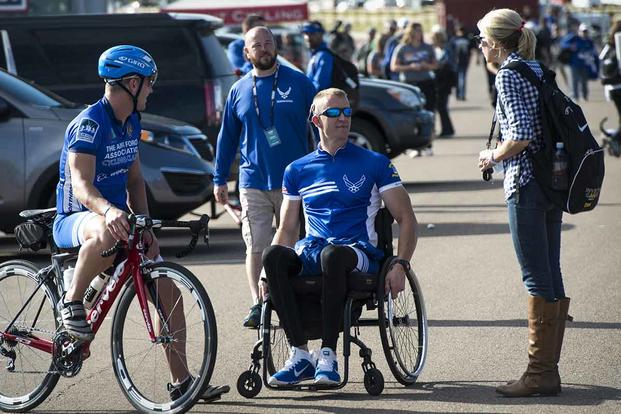The Department of Veterans Affairs needs to step up outreach and coordination to caregivers of disabled veterans to ensure that they are aware of available programs and they understand the eligibility requirements for each, a key VA advisory panel has recommended.
A VA Veterans' Family, Caregiver and Survivor Advisory panel subcommittee says VA does not collect demographics data on caregivers and falls short in explaining programs designed for caregivers and vets who need help at home, leading to a lack of understanding on both sides and missed opportunities for veterans.
During a meeting this week in Washington, D.C., researchers and members of the panel's Families and Caregivers Subcommittee said VA must improve data collection and increase outreach and care coordination to ensure that veterans and caregivers understand the eligibility criteria of programs.
Read Next: 'A Total Shock': Parents Mourn Sudden Death of Their Air Force Academy Son
VA should start, panel members said, by collecting information on race, ethnicity, age, gender, language, religion and sexual orientation of veterans' caregivers -- a move they say would help the VA address the "cultural and generational" needs of caregivers and ensure that the VA's caregiver programs are equitable.
"VA is not systematically collecting data on caregivers," Dr. Luci Leykum, the VA director for the Center of Excellence for Veteran and Caregiver Research, told committee members. "We have so little understanding of who these people are."
The VA manages numerous programs to provide support and care for disabled and elderly veterans, the largest being the Program of Comprehensive Assistance for Family Caregivers -- a program that provides health benefits, services and a stipend and other services to individuals who care for veterans in lieu of hiring a home health aide or placing the veteran in a care facility.
In addition to that program, also known as the Family Caregiver Program, the VA runs the Program of General Caregiver Support Services, which provides peer support, mentoring, coaching and referrals for caregivers.
The department's Office of Geriatrics and Extended Care also offers home services, such as health aides, respite care and more.
The VA fails, however, to adequately explain eligibility for these programs and manage caregiver expectations, the subcommittee found.
If VA better explained all available programs and managed expectations of the requirements, this would result in greater understanding of the program among veterans and caregivers and fewer ineligible veterans applying, at least for the Family Caregiver Program, the subcommittee members said.
Subsequently, the number of rejections for the program would decrease, they added.
Subcommittee Chairwoman Melissa Comeau said there is "widespread misunderstanding about eligibility and the 10-step application process" of the Family Caregiver Program.
VA also misses an opportunity to communicate with caregivers when it issues denials for the family program. A rejection should be accompanied with information on general caregiver support services so that caregivers are aware of the benefits that are available outside the family program, the panel recommended.
The subcommittee also recommended that VA improve its management and coordination of programs that may run in conjunction with caregiver programs, such as those offered by the VA Office of Geriatrics and Extended Care, including respite care and home health care.
Because vets, caregivers and even VA staff don't understand the parameters of these programs, vets and caregivers are often left "scrambling" for appropriate clinical support, according to the panel.
The members recommended that VA improve its processes to ensure that veterans eligible for these programs have access to them.
The Veterans' Family, Caregiver and Survivor Advisory Committee advises VA Secretary Denis McDonough on issues related to veterans' family members, caregivers and survivors and makes recommendations on policies, programs and services related to families of former service members.
Business of the committee has been closely watched by veterans and caregivers enrolled in the Family Caregiver Program since problems first arose in 2017 over inconsistencies in application approvals and program participation.
The VA paused discharges from the program last March after a change in eligibility criteria was expected to make up to 90% of participating families ineligible for the program. Following the criteria change, which coincided with expansion of the program to veterans of all eras, caregivers of post-9/11 veterans said they were being unfairly dismissed from the program, saying assessments under the new rules did not account for veterans who require supervision and protection and focused only on severe physical disabilities.
VA is currently reviewing the program and its eligibility criteria and plans to resume eligibility assessments of currently enrolled veterans and caregivers on Oct. 1, 2025.
The committee provided an opportunity at the meeting for public comment, drawing veterans, caregivers and advocates to push for broader recognition of those affected as well as changes to the program.
Caregiver Robin Stitt said the "financial, emotional and physical support [of the Family Caregiver Program] is unmatched" when managed correctly, but she called for VA to install a new senior adviser on families, caregivers and survivors and said medical personnel, not social workers, should conduct eligibility assessments.
She, and others, also criticized the recommendations put forward by the advisory committee to date.
"It's our choice to care for our veterans at home. The program provides some scaffolding to provide that care. You have had ample time to provide recommendations, but we have not seen any recommendations or any action regarding the erroneous discharges and false notes in our medical records and our veterans' medical records," Stitt said.
-- Patricia Kime can be reached at Patricia.Kime@Military.com. Follow her on Twitter @patriciakime.













